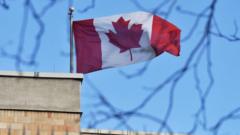The four individuals, whose identities remain undisclosed, were executed despite Canada's repeated calls for clemency. Foreign Minister Mélanie Joly expressed her deep concern, stating that the government had been closely monitoring the cases and had attempted to intervene at the highest levels. China’s foreign ministry defended the actions, stating that they were carried out "in accordance with the law" and urged Canada to respect its judicial sovereignty.
Human rights organizations, including Amnesty International, have condemned the executions as shocking and inhumane, calling on Canada to re-evaluate its foreign policy towards China. These cases come in the wake of strained relations following the 2018 detention of Huawei executive Meng Wanzhou in Canada, which led to retaliatory actions from Beijing, including the arrest of two Canadian citizens who have since been released.
Calls for clemency through diplomatic channels were deemed unsuccessful, with Joly emphasizing Canada's steadfast opposition to capital punishment. The situation highlights the precariousness of Canada-China relations which have deteriorated due to not only the drug case but also allegations of Chinese interference in Canadian elections and ongoing trade disputes.
As this latest incident unfolds, it raises concerns about the safety of Canadians in foreign nations and further complicates existing geopolitical dynamics.
Human rights organizations, including Amnesty International, have condemned the executions as shocking and inhumane, calling on Canada to re-evaluate its foreign policy towards China. These cases come in the wake of strained relations following the 2018 detention of Huawei executive Meng Wanzhou in Canada, which led to retaliatory actions from Beijing, including the arrest of two Canadian citizens who have since been released.
Calls for clemency through diplomatic channels were deemed unsuccessful, with Joly emphasizing Canada's steadfast opposition to capital punishment. The situation highlights the precariousness of Canada-China relations which have deteriorated due to not only the drug case but also allegations of Chinese interference in Canadian elections and ongoing trade disputes.
As this latest incident unfolds, it raises concerns about the safety of Canadians in foreign nations and further complicates existing geopolitical dynamics.


















